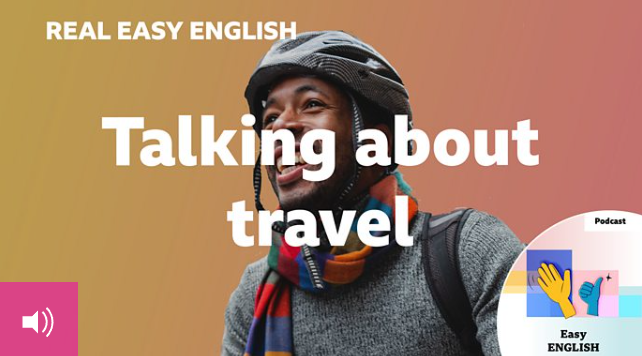Introduction
Neil and Georgie have a real conversation in easy English about their journeys to work. Learn to tell someone about your journey using prepositions.
Vocabulary
towards
travelling in the direction of
across
travelling from one side to the other
rush hour
the time of day when lots of people are going to work or school
traffic jam
a delay whilst you are driving
Transcript
Neil
Hello and welcome to Real Easy English. In this podcast we have real conversations in easy English to help you learn. I’m Neil.
Georgie
And I’m Georgie. Remember, if you want to read along to this podcast, you can find a script on our website: bbclearningenglish.com.
Neil
Hi, Georgie. How are you doing?
Georgie
I’m fine thanks, Neil. How are you?
Neil
I’m very well, thank you.
Georgie
What’s today’s conversation about, Neil?
Neil
Today we’re going to talk about travel. We talked about holidays in another episode. But today we’ll talk about everyday travel and compare our journeys to work.
Georgie
So, Neil. What is your journey to work like?
Neil
Well, because we live in London and it’s a big city, it’s quite long. But I get a bus to a tube stop. The tube is the underground train. And then I get the tube to near the BBC and then I walk.
Georgie
Nice. I walk to work. I don’t like using the tube, the underground train, because there’s so many people on it. I prefer to get some fresh air in the morning.
Neil
Ah, you walk to work. That’s interesting in London. Tell me about your walk to work.
Georgie
Well, my walk starts with walking along some streets towards a park and then I walk across a park and then I walk through some more streets because there is a little bit of time between the park and the office and then I arrive at the office.
Neil
Very nice. So you don’t like public transport?
Georgie
I use it sometimes when there’s an emergency like if it’s raining or if I don’t have time. But if I have time I like to walk to work.
Neil
And how long does your journey take?
Georgie
My journey takes me one hour if I walk and thirty minutes if I take the tube.
Neil
That’s pretty good for London.
Georgie
What about you?
Neil
My journey takes at least an hour, sometimes more.
Georgie
And Neil, you have to get a bus and a train. What’s your journey like?
Neil
Well, it can be good, but sometimes there’s traffic jams on the roads and so the bus can take a long time. But once I get on to the tube, it’s usually OK as I travel across London.
Georgie
Ooh, Neil, can you explain what we mean by traffic jam?
Neil
Yeah, so a traffic jam is when there are too many cars and buses on the road and so the traffic can’t move very quickly or can’t move at all.
Georgie
Oh yeah traffic jams are so rubbish. Are there times of the day when there are more traffic jams?
Neil
Yes, so during rush hour. Rush hour is when most people are going to work so the roads are busier. And also, if it’s the school run. School run time, so lots of people on the roads, taking their kids to school, then the bus journey takes a long time.
Georgie
OK. So, that’s in the morning and in the afternoons?
Neil
Yeah. That’s right.
Well, Georgie, your journey to work sounds nicer than mine, probably more relaxing.
Georgie
Yes. Not when it’s raining, though.
Neil
Let’s recap the words we learned during the conversation.
Georgie
We had towards – travelling in the direction of.
Neil
Across – travelling from one side to the other.
Georgie
Rush hour – a time when a lot of people are moving around the city, usually for work or school.
Neil
And an expression for something I hate: traffic jam, which we use to talk about a big delay when you’re driving.
Georgie
Thanks for listening to Real Easy English. Visit our website for more activities and courses to help you with your English: bbclearningenglish.com.
Neil
Next time, we’ll talk about the news.
Georgie
See you, then. Bye.
Neil
Goodbye!
